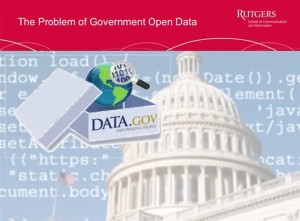 Yesterday we held our third Social Media Expo at the 2015 iConference, sponsored by FUSE Labs at Microsoft Research. This has been a great way for us to encourage interdisciplinary student teams to explore emerging themes in the field that are also of particular interest to FUSE Labs.
Yesterday we held our third Social Media Expo at the 2015 iConference, sponsored by FUSE Labs at Microsoft Research. This has been a great way for us to encourage interdisciplinary student teams to explore emerging themes in the field that are also of particular interest to FUSE Labs.
The 2015 Theme: Open Government Data and Social Media
This year’s challenge was to “explore new and exciting ways to foster societal awareness and conversation at the intersection of open data and social media”. In 2009 the white house sent out an Open Government Directive, requiring government agencies to adopt the principles transparency, participation, and collaboration in part by publishing government data online in open formats. Five years later there is an amazing plethora of information freely available, enabling people to “conduct research, develop web and mobile applications, design data visualizations, and more”. (see http://www.data.gov). At the same time, an analysis of social media data helps us understand and reflect on historical and real-time aggregate behavior, allowing both organizations and individuals to gain a deeper understanding of their society. These two trends create an opportunity for a kind of large scale conversation – as governing agencies share their data with their citizenry, and as the population at large engages with organizations through tools such as Twitter, blogs, and Facebook. We encouraged teams to approach this year’s theme with an interdisciplinary combination of user research, design explorations, prototyping, real world deployments with usage analysis, or community engagement.
The winning teams:
We were very pleased with the quality of the submissions this year, and we to thank the five winning teams who received the grant for all the work that went into their projects and their presentations at the Social Media Expo. The best project award went to the University of California, Irvine’s team, for their project “ Racial Violence Archive: Public Information System on Incidents of Violence during the Civil Rights Period”.
eMigrate: Aggregating Government Open Data for Enhanced Job Category Selection in Support of Immigration Applications
School: University of Toronto: Faculty of Information
Team: Eva Hourihan Jansen, Jenna Jacobson, Gabby Resch
Faculty Sponsor: Rhonda McEwen
The Police Officer Involved Homicides Database Project
School: University of California, Los Angeles: Department of Information Studies
Team: Morgan Currie, Brittany Paris, Irene Pasquetto, Jennifer Pierre, Ashley E. Sands
Faculty Sponsor: Leah Lievrouw
Racial Violence Archive: Public Information System on Incidents of Violence during the Civil Rights Period
School: University of California, Irvine: The Donald Bren School of Information and Computer Sciences
Team: Hosub Lee, Michael Bellato, Sowmya Jain, Fernando Spanghero, Roeland Singer-heinze, Ya-Wen Lin, Sunakshi Gupta, Geoff Ward
Faculty Sponsors: Alfred Kobsa and Geoff Ward
Society Key: Integrating Social Media Data with Governmental Open Data to Encourage Community Wellbeing
School: Rutgers, The State University of New Jersey: School of Communication and Information
Team: Ziad Matni, Jennifer Sonne, Dongho Choi
Faculty Sponsor: Chirag Shah
TransparencyScience. Return on research investment, where do the funds go?
School: Polytechnic University of Valencia: School of Informatics
Team: Lidia Contreras, Cristina I. Font, Paulina Morillo, Diego Vallejo
Faculty Sponsor: Antonia Ferrer Sapena
Emerging Themes and Discussion:
Following the presentations we had a brief discussion. Common threads across the talks and discussion include:
-
Filing the gaps. As noted particularly for the Police Officer Involved Homicides project, there is often a gap across different sources of data, and social media may be used to help fill the gaps to increase accuracy and interpretability. Government data can also sometimes be out of date, and social media may be used to help bring it up to date (e.g., classification of job categories for the eMigrate project).
- Translating data for end users. Government data as shared in its raw form can be fairly opaque to the average person. A key problem that can be addressed by information technologists is transforming it through simplification, explanations, and visualizations, so that it is actionable for everyday citizens.
-
Community Engagement. Student teams generally found that people were very interested in engaging around the data, and further found that a hackathon format was quite successful vehicle for enabling deep engagement and community connections with like-minded others. As researchers/information technologists, they found they tended to take on a teaching role, helping people to engage with the data. Many have low levels of self-efficacy around engaging with open data and technology, and require some hand-holding.
-
Developing the community of practice. Researchers, technologists, and “digital journalists” need to develop best practices for dealing with ethical issues, increasing engagement and end-user confidence, and assuring projects are not exploitative.
-
Social media facilitates participatory. Across the student projects, we observed social media and social media design patterns could play a meaningful role in helping the new open data environment become more participatory and collaborative.
Thanks again to our student teams for their hard work, their faculty sponsors for providing guidance, the organizing committee for developing the theme and writing reviews, and the iConference for generously hosting the Social Media Expo.
Please learn more about the team project by reading their abstracts or watching the video submission on Youtube.
